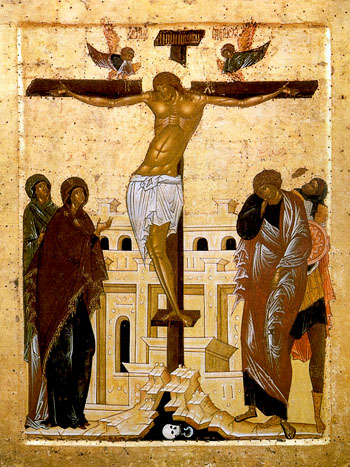And when he had called the people unto him with his
disciples also, he said unto them, Whosoever will come
after me, let him deny himself, and take up his cross, and
follow me. For whosoever will save his life shall lose it;
but whosoever shall lose his life for my sake and the
gospel's, the same shall save it. For what shall it
profit a man, if he shall gain the whole world, and lose
his own soul? Or what shall a man give in exchange for his
soul? Whosoever therefore shall be ashamed of me and of my
words in this adulterous and sinful generation; of him
also shall the Son of man be ashamed, when he cometh in
the glory of his Father with the holy angels. And he said
unto them, Verily I say unto you, That there be some of
them that stand here, which shall not taste of death, till
they have seen the kingdom of God come with
power.
—Mk. 8:34–9:1

But the Gospels, the Good News that we have heard today goes further. We are talking about following the Lord unto death. This is our daily life. But in order to follow Him, each of us is called to take up our cross; that is, to deny ourselves. We understand that this is not just resistance to sorrows or patient endurance of them. Taking up our cross means touching the very root of suffering and death, in which our world lies. We are talking about our unapproachable heart. Denying ourselves means saying “no” to the mortal poison in us of our own reasoning without God; our own love, our own will.
The world is filled with madness, and we right are there with it. We think to gain our lives when acting out of our own ego, which fixated on itself; however, in doing so we lose our lives. The divine beauty of the Cross reveals to us that only by turning our back upon our own reasoning, our own love, and our own will, and by turning to the One Who does not belong to Himself, who gives Himself entirely to us, can we obtain life, which has found us and loves us.
This is the healing that we obtain when the Holy Spirit works in us, inculcating in the very heart of this Fast the joy and radiance of the Cross. We know how bitter and hard it is to deny our own reasoning, our own love, and our own will. But the divine power of the Cross consists precisely in this: if we accept it, the Spirit of the Lord will say “no” in us to death and “yes” to Christ’s love. Instead of bitterness and heaviness, great strength, sweetness and joy will fill our hearts. “God cleanse me a sinner”—behold the power of the Cross.
This is possible because the Cross is the Tree of Life, and the Lord is its fruit. We taste of this fruit when we commemorate His death and Resurrection and receive His Body and Blood. And if we nevertheless find this too hard, let us turn trustingly to Her who stands by the Cross and gives us unendingly this fruit of life.
The human soul is more precious than anything in the world. It must be saved at any price, even if this price seems too high in many people’s opinions. We belong to the Church of martyrs and confessors. The holy martyrs are witnesses: giving your life for Christ means gaining it and accomplishing it to the fullest. There is no half meaning or ambiguity in the Lord’s words—to be ashamed of Christ and His words in this sinful and adulterous generation signifies the temptation to turn away from the Lord rather than die for Him in times of persecution.
There be some of them that stand here, which shall not taste of death, till they have seen the kingdom of God come with power. This refers to the Lord’s Transfiguration, and Resurrection; it refers to the future grace that the Church will grant us to know. Following Christ unto death is following a path that leads to the Kingdom of God, which is revealed to the faithful while still here on earth.
